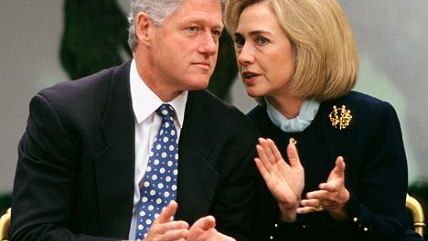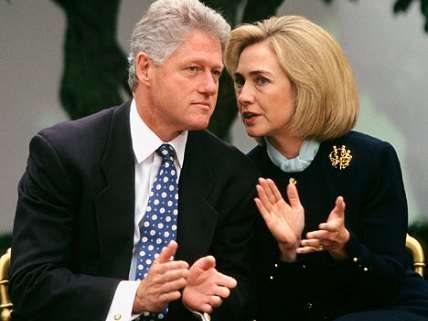Bill Clinton Probably Won't Give Paid Speeches if Hillary is President, Foundation Will Presumably Churn On
The former president dismissed concerns about Clinton Foundation donations.


In an interview at the Clinton Foundation conference in Denver, Bill Clinton said he didn't think he'd give paid speeches if Hillary Clinton were elected president, not because he believed it could be improper, but because of the controversy it could cause. "Once you get to be president," he explained, "then you're just making a daily story.
In his most substantive comments on the Clinton Foundation since its history of donors who were trying to do business with the U.S. government gained media scrutiny, the former president also vigourously defended the donations. Via Reuters:
"No one has ever asked me for anything," he said of the foundation's donors.
Clinton said he did not know whether foreign governments, companies and other foundation donors were seeking anything in return beyond supporting philanthropy.
"And I don't think Hillary would know, either," he said. "She was pretty busy those years. I never saw her study a list of my contributors, and I had no idea who was doing business before the State Department."
Journalists and political opponents have failed to turn up any proof that Clinton's State Department sold favors. The Clintons dismiss the allegations as politically motivated.
But an increasing number of Americans have said they find Hillary Clinton untrustworthy in polls.
"Yeah, but I mean we're used to it," her husband said.
The Clintons are, if nothing else, sharp political minds, so it shouldn't be surprising there's no paper trail of them studying foundation donors or connecting contributions to favors at the State Department when Hillary Clinton ran it, or elsewhere in government. The absence of evidence, of course, is not the evidence of absence. It's nice, I suppose, that Bill doesn't think he'll give paid speeches if his wife is president, but it doesn't address the wider issue of the Clinton Foundation's potential to act as a place to launder bribes if Hillary becomes president.
The left loves to fetishize money in politics. From a free market perspective, there's nothing wrong with the Clintons trading on their brand name to earn money on speeches. Whether their speeches are worth the money paid for them absent their connections to government is an open question. And if the donors are paying for access to government favors, then whether or not the Clintons delivered on the access isn't relevant, only whether the access, or the appearance of it, played into how much got paid.
Democrats faulted Mitt Romney, a deeply flawed Republican candidate, for his business career, which consisted largely of making money by providing advice on how businesses can be run better. If he gave poor advice and his client's business failed, it effected his reputation and future income-earning potentials. The Clintons, on the other hand, made their money trading on their history of "public service." By the left's own principles, the Clintons ought to be shunned. But with the left it's principals over principles, especially but not exclusively in the run up to elections. So Marco Rubio not using his political influence to make traffic tickets go away is a scandal but outrage over the Clintons using their access to government to turn a profit is treated as just another politically motivated hit job.


Show Comments (64)